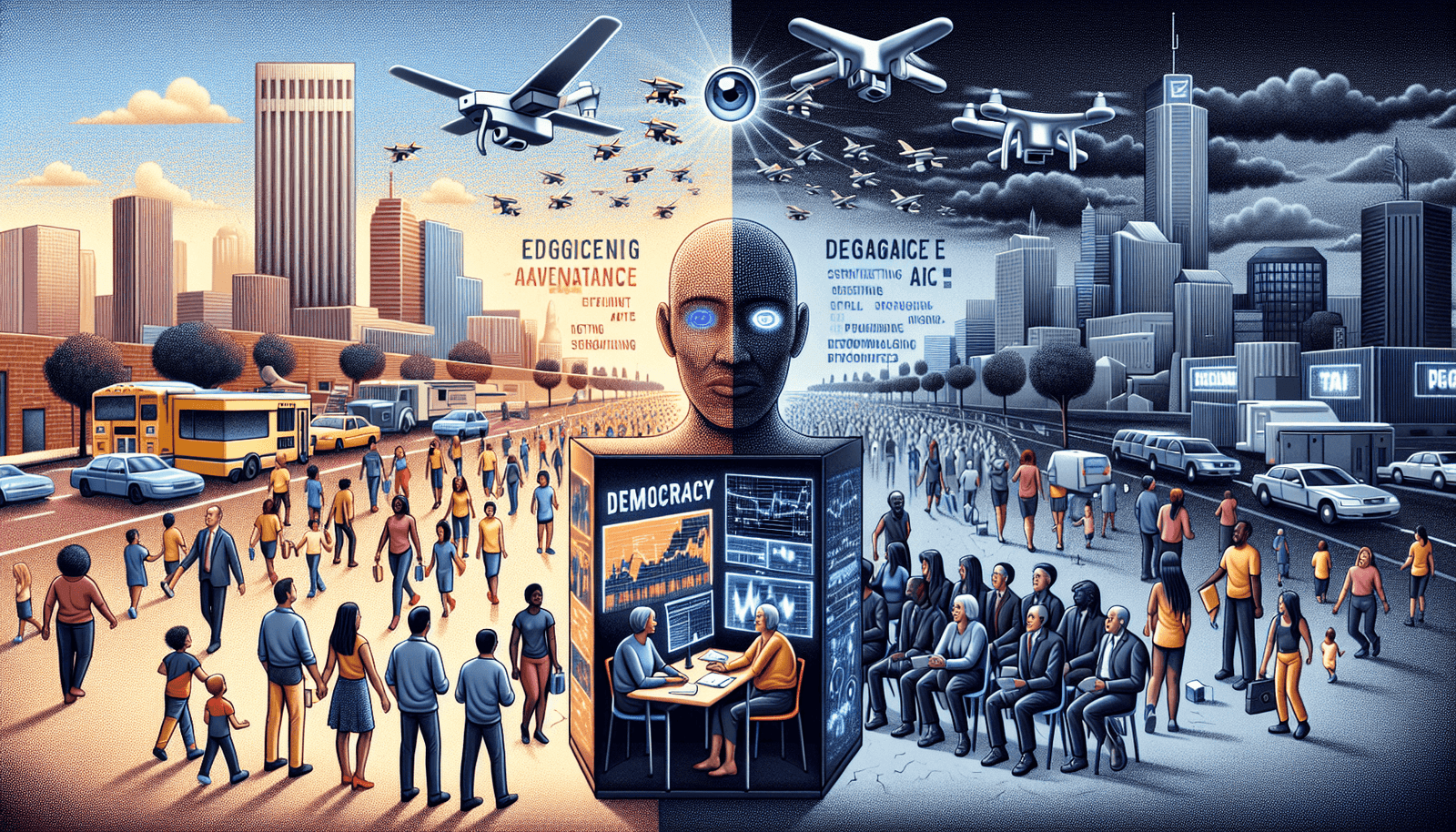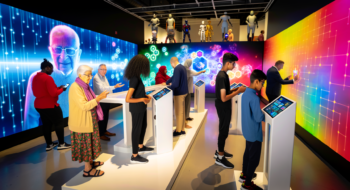In the rapidly evolving landscape of technology, artificial intelligence (AI) stands as both a beacon of innovation and a source of profound debate regarding its implications for democracy. As AI transforms various sectors, its applications raise critical questions about the enhancement or erosion of democratic values. This discourse delves into the dual-edged nature of AI, exploring how it can empower civic engagement and streamline governance while simultaneously posing risks to privacy, misinformation, and surveillance. Understanding this balance is essential as we navigate the future of democracy in an AI-driven world.
The Bright Side of AI: Enhancing Democracy
Artificial intelligence has an undeniable potential to boost democracy in myriad ways. From improving public services to enhancing citizen engagement, AI can create a more informed, participatory, and accountable governance system. Here are a few key areas where AI is making waves:
- Data-Driven Decision Making: Governments can utilize AI algorithms to analyze large datasets, facilitating informed decision-making. By understanding trends and predicting future needs, authorities can respond more effectively to citizens’ demands.
- Increased Participation: AI tools can help break down barriers to civic engagement. For example, chatbots and virtual assistants can answer citizens’ questions about voting and policies, making government more accessible.
- Fraud Detection: AI can enhance election integrity through improved fraud detection mechanisms. By monitoring voting patterns and anomalies, AI systems can flag potential irregularities for further investigation.
- Efficient Resource Allocation: AI applications can optimize government resources by predicting where services are most needed, improving resource allocation in areas such as healthcare and public safety.
This early excitement surrounding AI’s potential to enhance democracy is akin to stepping onto a beautifully lit path that promises progress and innovation. Yet, as with all things in life, this path comes with its shadows.
The Dark Side of AI: Eroding Democracy
While the bright prospects of AI highlight its potential benefits to democratic values, the technology coexists with significant risks that threaten democracy’s very foundation. Concerns regarding privacy, misinformation, and surveillance loom large—a reality that calls for vigilance. Here are some of the most pressing issues:
- Privacy Invasion: AI systems require vast amounts of data to function effectively. This data often includes personal information, leading to potential breaches of privacy. Citizens may inadvertently sacrifice their personal autonomy for the sake of “better services.”
- Manipulation and Misinformation: As AI-generated content becomes more sophisticated, distinguishing between fact and fabrication becomes increasingly challenging. This raises concerns over the role of AI in spreading misinformation and potentially swaying public opinion during elections.
- Surveillance State: Governments could leverage AI for surveillance purposes, tracking their citizens under the guise of security. This not only erodes personal liberties but also fosters a culture of fear, stunting free expression and dissent.
- Algorithmic Bias: AI systems are only as good as the data they are trained on. If these datasets are biased, it can lead to unfair treatment and discrimination against marginalized groups, undermining the principle of equality before the law.
With these issues at hand, the conversation shifts to a critical juncture: can AI-enhanced actions genuinely support democratic values, or are they destined to create a landscape more authoritarian than democratic?
AI as a Tool for Civic Engagement
One of AI’s most promising applications lies in enhancing civic engagement. From predictive analytics to offer insights into community needs to Machine Learning models designed to analyze public opinion data, AI can empower citizens and encourage deeper involvement in governance. Here’s how:
- Personalized Information: Through AI algorithms, citizens receive tailored information about local issues and potential actions they can take. This personalization can stimulate participation and motivate more individuals to become active in the political process.
- Real-Time Feedback: AI can facilitate real-time feedback mechanisms, allowing citizens to interact with their representatives much more readily. This could set a new precedent for responsiveness in governance and greater accountability among elected officials.
For instance, organizations are already experimenting with AI-driven platforms that analyze social media input and assess community sentiment. By transforming public opinions into actionable data, AI can create a direct line between citizens and decision-makers.
The Importance of Regulation and Ethical Standards
As AI applications steadily weave their way into the democratic fabric, it becomes increasingly critical to establish regulations and ethical standards that guide these technologies. Striking the balance between innovation and the safeguarding of democratic values is no simple feat. Here are some approaches that can be considered:
- Transparency: Encouraging organizations to remain transparent about the algorithms they use, and how they process data, can aid in building public trust and understanding.
- Accountability: There must be mechanisms in place to hold those who misuse AI accountable, especially in instances where its application violates civil liberties or personal rights.
- Public Engagement: Engaging citizens in discussions regarding AI’s role in democracy ensures that their voices and concerns shape the implementation of these technologies.
Without addressing these concerns, we risk empowering a system where citizens feel disillusioned, manipulated, and marginalized—a far cry from the principles of democracy.
Finding a Path Forward
As we navigate this juncture in technological advancement, we must embrace a future that nurtures democratic principles rather than undermines them. This involves a collaborative effort among governments, tech companies, civil society, and citizens alike to create a digital democracy that thrives on trust and involvement rather than fear and misinformation. Here are a few steps we can take:
- Education and Awareness: Promoting digital literacy and educating citizens about AI’s capabilities can empower them to engage critically with emerging technologies.
- Community Involvement: Community-driven initiatives can harness AI to address local issues while ensuring that minority voices are amplified in the discussion.
- Focus on Ethics: Ethics should be the cornerstone of AI development, ensuring that technology serves humanity rather than the other way around.
As we embark on this journey, it’s vital to remain vigilant. This means not simply embracing AI technology for its promise but actively ensuring that it complements democracy rather than contravening it. As we continually strive towards a well-informed, engaged populace, we can look to innovative solutions that reaffirm democratic values.
The question remains: will AI serve as a tool for enriching democracy or merely a mechanism for its erosion? By carving a path that emphasizes ethical standards and priorities citizen engagement, we can foster a future where technology aids democracy rather than subverts it. In this evolving narrative, every stakeholder must take part, ensuring that the voices of the many are heard and honored.
If you’re interested in diving deeper into the conversation about AI and its impacts on democracy, I recommend checking out helpful resources available from Neyrotex.com.
As the technological landscape continues to unfold, let us not forget that it’s our responsibility to sculpt this future, guiding the narrative of AI towards a vision that reverberates with the ideals of democracy. Together, we have the power to harness AI as a potent tool for good, crafting a more harmonious interplay between innovation and our democratic foundations.







